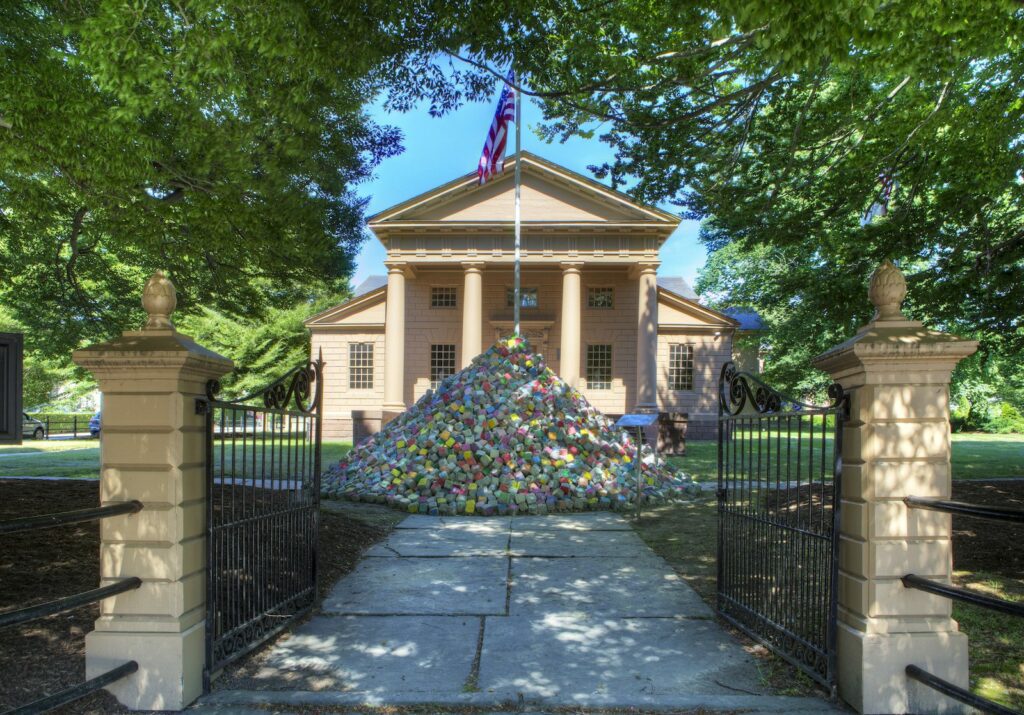Redwood Library & Athenaeum, Newport, RI, United States
10 Jul 2018 - 28 Oct 2018

Pascale Marthine Tayou, 'RememberBimbia' at Redwood Library
Remember Bimbia, a site-specific installation by Belgian- Cameroonian artist, Pascale Marthine Tayou is now on view at the Redwood Library & Athenaeum. The outdoor sculpture, a remembrance of a major slave market in Cameroon, launches the Redwood’s Material Politics initiative, a three-year slate of outdoor installations, art exhibitions, lectures, symposia and public programs devoted to plumbing the political and social implications of the materials and processes of contemporary art.
Commissioned by the Redwood Contemporary Arts Initiative (RCAI), Remember Bimbia is one of Tayou’s few public installations in the United States, and the artist’s first slavery memorial. Remember Bimbia recalls a onetime slave market, now nearly overgrown by equatorial forest overlooking the Atlantic Ocean in Tayou’s native country of Cameroon. Tayou’s call to memory serves not only as a specific gesture to a site near where he grew up—and with it, an acknowledgement of the role that Africans played in the slave trade—but also as a larger appeal to acknowledge slavery as foundational to Euro-American history. Slavery powered the economies of the new world as much as the old, and it was crucial to the prosperity of the “lively experiment” of Rhode Island. Tayou writes of Remember Bimbia, “Slavery is part of our communal history: it is a history that belongs to us all. The colored stones are a symbol, a portrait of a world that is as strong as it is fragile; the face of the world that is as ugly as it is beautiful”.
Remember Bimbia comprises a 12-foot high pile of granite paving stones, each bearing a facet painted a different color, with the American flag planted in its center. Leora Maltz-Leca, Redwood Curator of Contemporary Projects and Material Politics project leader, comments: “Tayou’s sculpture moors the American flag – its history and its futures – in the rubble of our repressed past, partly by pointing us to West Africa, and to the foundational role that African peoples played in the founding and success of this country. The stones, similar to those that still pave Newport streets, summon not only revolutions past – barricades breached; paving stones flung – but also revolutionary dreams of equality and justice yet unfulfilled. This evocation is especially poignant in 2018, on the fifty- year anniversary of the summer of 1968.”
The Material Politics initiative stems from the need to acknowledge Rhode Island’s extensive engagement with the slave trade, and specifically, from a desire to grapple with the contradictions of the Enlightenment legacy embodied in the Redwood itself. Chartered in 1747 « with nothing in view but the good of mankind, » the Redwood offered the hope of a better world through education and cultural refinement, yet owed its creation to black slave labor, given that Abraham Redwood’s wealth derived from his sugar plantation in Antigua and his participation in the triangle trade.
The outdoor sculpture will be on view on the Redwood’s front lawn until 28th October 2018.